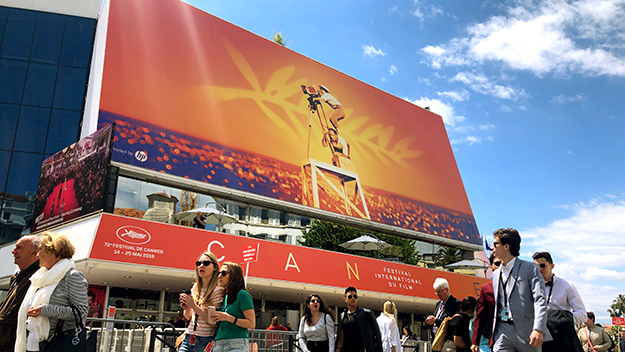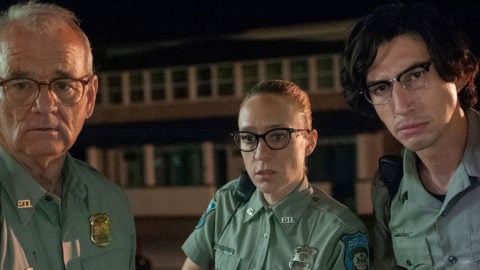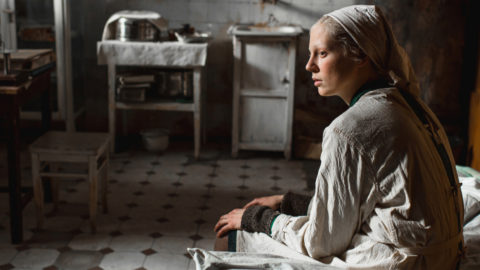Cannes Dispatch: Agnès‘s Shadow

Photo by Eugene Hernandez
Agnès Varda looms large over the 72nd edition of the Cannes Film Festival. The official poster of this year’s festival—emblazoned on a striking orange billboard that sits atop the Palais des Festivals—features an image of the iconic French filmmaker, who died in March, at age 26 shooting her first film, La Pointe Courte. She’s standing on the back of a technician, looking through a camera lens.
Varda has been hailed by festival organizers as the “guiding light” of this year’s edition. When she was in Cannes last year, Varda led a demonstration in support of female filmmakers. She was one of 82 women, each representing a female-directed film that screened in past Cannes competitions, to ascend the red-carpet steps of the Palais in protest of this historical exclusion (1,645 selections had been directed by men, by contrast). Out of this year’s 21 films in competition, four are directed by women. That marks a high point, so it occasions a moment to consider the progress actually being made by women in film culture. There still has been only one woman ever awarded the Palme d’Or: Jane Campion for 1993’s The Piano.
Cinema’s leading showcase and marketplace seems to struggle each year when the topic inevitably arises. Last year, Cannes head Thierry Frémaux said, “We’re doing our best to ensure that our selection is well-balanced and diverse. There will be more and more [women filmmakers] in the future.” This week, Frémaux defended the festival during a press conference: “Cannes is always criticized. They [the press] ask Cannes to do things they don’t ask other festivals to do. The Cannes Film Festival is asked to be absolutely perfect and impeccable.” Frémaux then used Varda’s words: “Agnès used to say to me, ‘I’m not a woman director; I’m a woman and a filmmaker—promise me you will never simply select a film because it’s made by a woman.’”
In keeping with a pledge he signed in the wake of last year’s red-carpet march, Frémaux shared stats from his festival’s submission process. He said that the ratio of female-directed films playing in the festival is on par with the percentage of woman-helmed films submitted to his team for consideration this year.
Frémaux is also weathering criticism for a few programming decisions that celebrate controversial men, such as the inclusion of films in competition by Abdellatif Kechiche (Mektoub, My Love: Intermezzo) and Quentin Tarantino (Once Upon a Time in Hollywood). But the festival is facing even louder complaints for its decision to honor iconic actor Alain Delon with an honorary Palme d’Or. A petition against Delon—citing his misogynistic, homophobic, and racist remarks—was poised to hit 20,000 online signatures on the opening night of the festival.
On this topic, Frémaux seemed to lose patience during his press conference. “Why aren’t there more petitions in America?” Frémaux asked, citing the need to protest climate change, “in which the U.S. President is complicit.” He continued, “What did Alain Delon do? Today it is very difficult to reward or honor somebody because there is a political police that falls on you. It’s hard to judge Delon now with the eyes of someone who lives in the world today. Cannes as a festival condemns certain statements but we are in favor of freedom of expression. We will be honoring the actor with 100 percent enthusiasm.”
At least there’s nearly gender parity in the main competition jury: four women—including filmmakers Mamouna N’Diaye, Kelly Reichardt, and Alice Rohrwacher, and actor Elle Fanning—join directors Robin Campillo, Yorgos Lanthimos, and Pawel Pawlikowski, and writer Enki Bilal; the jury president is filmmaker Alejandro González Iñarritu. “It’s the first time I’m trying not to get out of jury duty,” Reichardt quipped yesterday during a press conference. “But I am looking forward to a time when we don’t have to say ‘the women directors’ or ‘as a woman…’”
“People keep asking us what it’s like being a woman director,” continued Rohrwacher. “And I am pleased that we are well-represented here [on the jury], but it’s a bit odd when we are asked this question. It’s like asking someone who survived a shipwreck why they are still alive . . . People have said there haven’t been enough women, but it’s not at the very end [of the chain] that you should raise these issues—it’s at the very beginning. This is a process and a chain that is beginning to change.”
Eugene Hernandez is Deputy Director of the Film Society of Lincoln Center and Co-Publisher of Film Comment.






